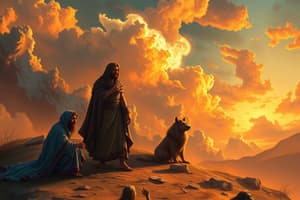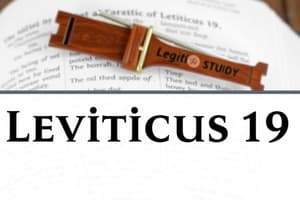Podcast
Questions and Answers
The book of Leviticus is primarily about Yahweh's plan for salvation.
The book of Leviticus is primarily about Yahweh's plan for salvation.
False (B)
The book of Leviticus provides instruction on how to build the tabernacle.
The book of Leviticus provides instruction on how to build the tabernacle.
True (A)
The individual Israelite can enter the holy of holies to make offerings.
The individual Israelite can enter the holy of holies to make offerings.
False (B)
Yahweh's presence is not yet among Israel when the book of Leviticus is being written.
Yahweh's presence is not yet among Israel when the book of Leviticus is being written.
The book of Leviticus is focused on making Israel a unique people among all the nations of the earth.
The book of Leviticus is focused on making Israel a unique people among all the nations of the earth.
The conduct described in Leviticus is necessary for salvation.
The conduct described in Leviticus is necessary for salvation.
The literary structure of Leviticus is widely agreed upon by scholars.
The literary structure of Leviticus is widely agreed upon by scholars.
The book of Leviticus provides instruction on how to have fellowship with Yahweh.
The book of Leviticus provides instruction on how to have fellowship with Yahweh.
The book of Leviticus is focused on making Israel a kingdom of priests.
The book of Leviticus is focused on making Israel a kingdom of priests.
The book of Leviticus is primarily about individual Israelites' relationships with Yahweh.
The book of Leviticus is primarily about individual Israelites' relationships with Yahweh.
According to Leviticus, the blood of animals can be eaten or drunk without any consequences.
According to Leviticus, the blood of animals can be eaten or drunk without any consequences.
The tabernacle is not central to Israel's life.
The tabernacle is not central to Israel's life.
Leviticus chapter 17 is a hinge chapter that summarizes the events of Exodus 32.
Leviticus chapter 17 is a hinge chapter that summarizes the events of Exodus 32.
The Israelites and aliens living among them are allowed to eat the blood of flesh without any consequences.
The Israelites and aliens living among them are allowed to eat the blood of flesh without any consequences.
The book of Leviticus is divided into three parts: the way to God, the walk with God, and the covenant with God.
The book of Leviticus is divided into three parts: the way to God, the walk with God, and the covenant with God.
Leviticus 1-10 deals with the offerings and the priests.
Leviticus 1-10 deals with the offerings and the priests.
On the Day of Atonement, atonement is only made for the priests and not the people.
On the Day of Atonement, atonement is only made for the priests and not the people.
The goat that is sent out into the wilderness represents the forgiveness of sin.
The goat that is sent out into the wilderness represents the forgiveness of sin.
Old testament saints had the same assurance of forgiveness as new testament believers do.
Old testament saints had the same assurance of forgiveness as new testament believers do.
The book of Leviticus only provides resources for understanding the purpose of the book, but not its structure.
The book of Leviticus only provides resources for understanding the purpose of the book, but not its structure.
Flashcards are hidden until you start studying
Study Notes
-
The book of Leviticus is about Yahweh speaking, giving instruction, and communicating aspects of his Torah, enabling Israel to live among his chosen people.
-
Yahweh's presence is already among Israel, and the book provides instruction on how to conduct their lives, enabling them to have fellowship with him and live a holy walk.
-
The literary structure of Leviticus is a major interpretive issue, with some seeing no coherent structure and others recognizing a narrative structure that follows the construction of the tabernacle and Yahweh's entrance into the midst of his people.
-
The corporate indwelling of Israel by Yahweh is already present, and the book provides instruction on how to take advantage of that indwelling and have fellowship with him.
-
The book's focus is on sanctification, with Israel being called to be a sanctified, set-apart people, a kingdom of priests, and a holy nation.
-
The conduct described in Leviticus is not for salvation, but rather a reflection of what God has already done and his presence already among them.
-
The book provides practicalities for Israel being God's special treasure, kingdom of priests, and holy nation, with God having instructed them, come to dwell among them, and made them a unique people among all the nations of the earth.
-
The individual Israelite can participate in offerings, coming to the doorway of the altar, and the priests can go into the holy place and ultimately into the holy of holies.
-
The tabernacle is central to Israel's life, and all of Israel is centered around it.
-
The literary structure of Leviticus is part of the narrative concerning the covenants that God made with Israel at Sinai, with Leviticus chapter 17 being a hinge chapter that sums up what the Lord has been communicating to Israel since Exodus 32 and the golden calf incident.
-
Leviticus chapter 17 emphasizes the importance of sacrificing animals only at the tabernacle, as commanded by the Lord, and warns against sacrificing to goat demons or idols, which is equivalent to shedding blood and will lead to being cut off from among the people.
Here is a summary of the text in detailed bullet points:
• The blood of animals must be drained and covered with earth, as it represents the life of the flesh, and eating it or drinking it is forbidden.
• The reason for this stipulation is to distinguish the Israelites from the gentiles, who practiced idolatry and ate blood.
• The Israelites and aliens living among them are not to eat the blood of flesh or else they will be cut off.
• The book of Leviticus is divided into two parts: the way to God (Leviticus 1-16) and the walk with God (Leviticus 17-27).
• Leviticus 1-7 deals with the offerings, which are the means by which God has given Israel to come into His presence, but sin does not have to be a barrier between the people and Yahweh.
• Leviticus 8-10 deals with the priests, who are necessary for priestly mediation, and Leviticus 11-15 deals with cleanliness, which is required for coming into fellowship with Yahweh.
• Chapter 16 is the culmination of the book, describing the Day of Atonement, which is the most important day of the calendar of Israel under the Mosaic covenant.
• On the Day of Atonement, atonement is made for the people to cleanse them and make them clean from all their sins before the Lord.
• The purpose of the Day of Atonement is to cleanse and wipe away all the sins of Israel, and Aaron and the two goats are used to represent the sins of the people.
• The goat that is sent out into the wilderness represents the removal of sin, and the Israelite who sees the priest's activity on his behalf in faith realizes that his sin has been removed and he is completely clean before Yahweh.
• If an Israelite comes into contact with something unclean, he must perform a sin and guilt offering to reestablish fellowship with the Lord.
• However, if he commits a premeditated sin, he must wait until the next Day of Atonement to confess and repent, as he cannot bring a sin and guilt offering.
• The old testament saint did not have the assurance of forgiveness like new testament believers do, as they could only look ahead and anticipate forgiveness, but not look back and know that it had been dealt with.
• The new testament believer has a privilege that the old testament saint did not have, as they can look back and see forgiveness, knowing that their sacrifice for sin has been given and accepted by God at the cross.
• The book of Leviticus provides resources for understanding the purpose and structure of the book, including commentaries by Rooker, Wenham, Hartley, and Kiuchi, as well as exegetical and expositional works by Allen Ross, Matthews, and Timbal.
Studying That Suits You
Use AI to generate personalized quizzes and flashcards to suit your learning preferences.




